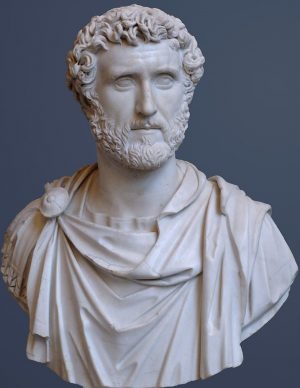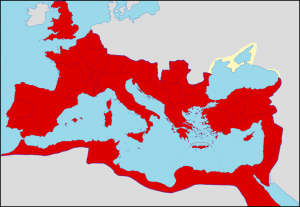Antoninus Pius was the fourth in the line of the Five Good Emperors of Rome, an emperor during the Nerva–Antonine dynasty. His reign started in 138 and ended in 161. He succeeded Hadrian who had adopted him. He was well-equipped for his rule due to the various positions given to him during Hadrian’s rule. Antoninus Pius’ reign of 23 years was one of stability and peace and he himself was admired for his amiable personality to both those in the government as well as common citizens.
Family Life and Background
Antoninus’ lineage was senatorial, originally from southern Gaul. Antoninus was born on September 19, 86 in Lanuvium, which was 20 miles from Rome. His full name was Titus Aurelius Fulvus Boionius Arrius Antoninus, the name of both him and his father who became a consul. His mother, Arria Fadilla, was the daughter of Arrius Antoninus who was consul twice in his lifetime. With two predecessors in consulate positions, Antoninus was in a good position to become one himself.
In his early life, Antoninus lived in Lorium within a huge estate. He was taken care of by his grandfather on his father’s side and then by his grandfather on his mother’s side.
In the time between 110 and 115, Antoninus married Annia Galeria Faustina who was Hadrian’s niece and the daughter of Marcus Annius Verus, a consul. She was also called Faustina the Elder. Although there were people who gossiped negatively about her, she was beloved by Antoninus.
Antoninus and Faustina had four children. Their two sons were Marcus Aurelius Fulvus Antoninus and Marcus Galerius Aurelius Antoninus, who both died before 138. Marcus Galerius Aurelius Antoninus’ sepulchral inscription was discovered in the Mausoleum of Hadrian in Rome. His name can also be found on one Greek Imperial coin.
The couple also had two daughters: Aurelia Fadilla and Annia Galeria Faustina Minor. Aurelia Fadilla passed away in 135 while Annia Galeria Faustina who was also known as Faustina the Younger went on to marry Marcus Aurelius, her cousin on her mother’s side in 146. This union made her a Roman Empress.
Faustina the Elder died in 141, which deeply affected Antoninus. His devastation prompted a series of acts of love for his dead wife to solidify the merit of her name. At his request, the Senate defied her and she was proclaimed a goddess. A temple in the Roman Forum was made in her name. Antoninus also had several coins portraying her image in honor of her. The words “DIVA FAUSTINA” alongside complicated designs could be seen on these coins. Furthermore, Antoninus started a charity named Puellae Faustinianae, which meant Girls of Faustina which helped girls in poverty so that they would be able to find good families. Lastly, Antoninus created another Roman welfare program, an alimenta, that aided the poor and orphaned Roman people.
Antoninus did not remarry after his wife’s death. He instead chose to live with a concubine named Galeria Lysistrate, who was once the slave of Faustina the Elder but had since become a freedwoman.
Rise to Power
The property in which Antoninus Pius grew up was passed down to him, giving him the land and riches he needed to rise in the ranks despite a lack of military experience. He was able to serve as quaestor, praetor, consul, and even governor in Asia Minor.
He had worked in his various positions with above-average performance and he was able to gain connections to other powerful members of Roman society. Antoninus was assigned as a consul with a colleague named Lucius Catilius Severus. Catilius was a Roman senator when Trajan and Hadrian were emperors. Later on, Emperor Hadrian appointed Antoninus as one of the proconsuls in Italia. Antoninus was popular and highly regarded by the citizens during this term.
Despite the favor Hadrian had shown towards Antoninus, he did not have Antoninus in mind as his successor at first. The latter part of 136 had Hadrian almost die from a hemorrhage. When Hadrian’s health declined and he was tempted to commit suicide, he aimed to bestow the power upon the consul Lucius Ceionius Commodus. He adopted Lucius and sent him to govern over Pannonia. To the shock of many, Lucius suffered from tuberculosis and died in January of 138.
Hadrian had two choices to replace Lucius, one was Marcus Aurelius and the other was Antoninus Pius. Although Hadrian wanted Marcus Aurelius to take the throne, he was still a young boy at the age of 16. Thus, Hadrian chose Antoninus to succeed with the condition that Antoninus would adopt Marcus Aurelius and Lucius Verus. Marcus Aurelius was Hadrian’s nephew while Lucius Verus was the first son of Lucius Ceionius Commodus, Hadrian’s first adopted son. Both would succeed Antoninus after his reign. Antoninus was thus adopted by Hadrian on 28 February 138 at the age of 51, making him his heir.
Lucius Catilius Severus, a former colleague of Antoninus and the prefect of Rome, opposed Antoninus’ rise to power. Despite this, Antoninus was able to claim his title as emperor.
Reign
Antoninus Pius became emperor on 10 July 138. His thoughtful nature was received positively by the Romans. He honored his predecessor Hadrian with much fervor, one of his first acts being to deify the former emperor. Antoninus was also forgiving to senators who Hadrian had sentenced to death in his time. There were also no huge military disturbances or revolts during Antoninus’ reign.
Just Administration
Antoninus was mild-mannered and involved in his administration. He often chose to run Rome from the city itself or from his estate due to the expense it would take to travel to distant areas in the empire. Many had thought that Hadrian had simply chosen Antoninus to succeed him while waiting for Marcus Aurelius to become old enough to succeed him much like Nerva before Trajan, former emperors among the Five Good Emperors. Thus, Antoninus continued with Hadrian’s policies. However, he employed a just and level-headed attitude towards his duties.
He was firm on his decisions about finances and trade, and commerce vastly improved during his rule. His diligence and concern for the betterment of Rome left an excess of funds in the treasury after his reign ended. The amount was estimated to be about 2.7 billion sesterces. One of the rare lavish expenses during his time was for the 900th anniversary of Rome in 147. There was an abundant feast and ostentatious gladiatorial events in the Colosseum. A new coin was made to mark the event.
Antoninus was also highly regarded for his compassion. He was well known for his policy which exempted cities that had recently suffered from natural disasters from paying taxes. These were a relief to those who had experienced fires like in Narbona and Rome. Rhodes and Asia had also suffered through earthquakes. Antoninus provided financial assistance to those who had been affected by the earthquakes. Greek cities were rebuilt at his command. Writers from these cities such as Pausanias and Aelius Aristides wrote about him with praise and admiration. The emperor had friendly relations with these cities from following Hadrian’s practice of mingling with the elites and intellectuals in these areas.
Among the Indian Kingdoms, Antoninus was also well-respected. He was the last Roman Emperor that they acknowledged. They admired his strong sense of justice and admirable appearance. In Marcus Aurelius’ reign, the Far East was freed from Roman control as the empire was wearing thin on military troops and resources.
Peaceful Rule
There were no written records of any military action during the reign of Antoninus. His lack of experience in this aspect of Roman society was rumored to have been the reason. Although there were some occurrences that warranted military force, these were few and far between and were not of a large scale. One occurrence of this nature was when a senator was sent to be a governor in Mauretania (present-day Algeria). The conventional choice would have been an equestrian procurator. There was a disturbance in the area and thus its towns were guarded more heavily during the time. Still, no serious conflict happened.
One military achievement during Antoninus’ time as emperor was when he, upon appointing a man named Quintus Lollius Urbicus as governor, was able to aggressively invade southern Scotland. In 139, Lollius was able to successfully garner new territories and build the Antonine Wall. This structure was constructed 60 kilometers from the Firth of Forth to the Firth of Clyde. This has only been discussed in one literary source, the Historia Augusta which contained a biography of Antonius. The construction of the wall was later decommissioned and abandoned in the first half of the 160s. The reasons for this decision are not known.
The attempt to build a wall much like Hadrian’s wall before him showed the necessity of Antoninus to gain some military victory considering there were also people who aimed to claim the throne from him. The Historia Augusta points to two people who tried to usurp the throne, the senators Cornelius Priscianus and Atilius Rufius Titianus. Both were charged for their attempts but not much fuss was made about the events. Antoninus did not need to worry because Priscianus died after committing suicide while the Senate declared that Titianus was guilty.
Death
As Antoninus grew to around 70 years old, he did not have the strength to stand or stay awake for long periods of time without help, so he gave Marcus Aurelius more responsibilities in the administration. When Marcus Gavius Maximus, who was one of Antoninus’ most reliable advisers died, Marcus Aurelius’ duties increased once again.
In 160, Antoninus Pius’ adopted sons Marcus Aurelius and Lucius Verus were made joint consuls that year. Antoninus died soon after on March 7, 161 at the age of 74.


